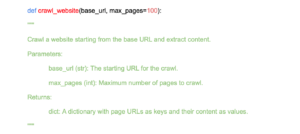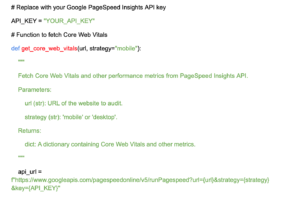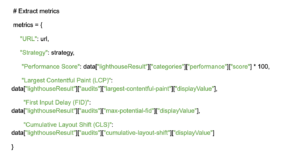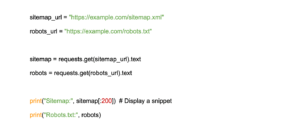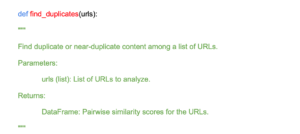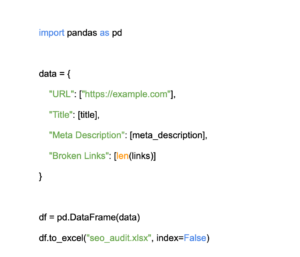Search engine optimization is never a one-time process. It’s an ongoing work that requires plenty of analysis and strategy improvements to achieve your long-term goals. Needless to say, monitoring your performance can be rather tedious if done manually, but it can be changed with the help of Python.
In this guide, we will tell you how to build your own SEO analyzer using Python and put tedious tasks on autopilot.
Source: Freepik
What Is SEO Audit?
A search engine optimization audit is an all-rounded website examination that strives to analyse SEO performance based on a combination of factors. Though the specific metrics targeted in the analysis can vary depending on your individual needs and goals, typically, it should deliver insights into the site’s overall traffic, indexed pages, site speed, keyword rankings, duplicate meta descriptions and titles, and many other performance mediums. The goal of such comprehensive analysis is to investigate the website’s visibility in search engines and identify weak points that can be improved for better SEO outcomes.
Why Should You Automate SEO Audits?
While the importance of running regular SEO audits is out of the question, as it helps you keep an eye on your results and make strategic improvements, some companies still doubt the importance of automating this process. Manual analysis, though it is possible and beneficial, doesn’t offer as many benefits as an automated SEO audit:
- A quick snapshot of the site’s performance.
- Improved efficiency and reduced workload for your team.
- Lower costs.
- Broaded audit coverage and better data accuracy.
- Detailed reports with actionable insights and predictions.
Of course, manual analysis brings human expertise to the table, but so does interpreting the results from automated analysis. This basically means that an automated SEO audit isn’t meant to eliminate a human touch but to simplify the process and save time and cost.
Getting started with SEO automation is also quite easy. Today, you can automate your site analysis with the help of a reliable online website audit tool, such as the Website Audit Tool by Ninja Reports. A tool like this provides you with a deep and reliable overview of your site's search engine optimization performance against 120+ factors and saves time for other important tasks. And if you want to automate the process of technical checks, in particular, you can do this with the help of Python.
How to Use Python for SEO Automation: 8 Tips to Try
1. Getting Started by Setting Up Your Environment
Before you can use Python for SEO, you must prepare the proper environment by installing Python and the necessary libraries.
First, go to Python.org, download the latest version of the programming language compatible with your OS, and run the executable installer according to the instructions. Then, consider installing the following baseline libraries to help you run SEO audits:
- BeautifulSoup - This library enables you to scrape your website for one particular URL or even a list of URLs. It also allows you to specify divs, spans, and CSSPath in the script to outline the particular aspects of data parsing.
- Requests - This is one of the essential libraries. It enables you to create HTTP requests to perform web scraping either from your site or your competitors’ sites.
- Selenium - This library is one of the most frequently used for automation. With its help, you can create a script that sets up a flow of steps in a specific sequence (e.g., opening a browser, clicking certain buttons, etc.).
- Pandas - This library is there to help you form data frames and manipulate the imported data. Basically, it’s used to clean and analyze the data efficiently.
2. Automate Site Crawling
Although Python can support your digital marketing efforts in many ways, one of the most common uses for audits, in particular, is to leverage libraries like BeautifulSoup to automate site crawling and scrape your web pages.
Source: Screenshot
3. Analyze Meta Tags and Headers
Meta tags are hidden HTML elements located in the <head> section of every page. They are used to provide info about a webpage to both users and search engines, meaning that optimizing them is pivotal for rankings. Header tags are also there to provide more context about your webpage to search engines, thus affecting your rankings while also improving user experience.
With some coding, you can create scripts for quick data retrieval and analysis of your title tags, meta descriptions, and headers to gain actionable insights for your strategy.
Source: Screenshot
4. Check Site Loading Speed and Core Web Vitals
Site speed is one of the cornerstones of user experience. When your pages load quickly, it improves engagement rates and makes users stay on your site longer. And since search engines reward positive user experience, your loading speed directly affects your rankings.
Apart from site speed, Google has a set of metrics that measure pages’ loading performance, interactivity, and visual stability in real-world settings. Together, these metrics are known as Core Web Vitals, and they also affect your rankings.
As you can guess, you can also leverage a Python script for SEO to check how your site performs in terms of loading speed and Core Web Vitals by extracting this data automatically from your PageSpeed Insights.
Source: Screenshot
Then, you need to specify which metrics you need to extract.
Source: Screenshot
5. Validate XML Sitemap and Robots.txt Files
A sitemap is basically a document that communicates to search engines which pages and files on your site are the most important and provides helpful information about them. Robots.txt files, in turn, guide search engine crawlers on how to access and crawl your site. These files are used to the block indexing of certain pages and, thus, prevent search engines from overloading your site with crawler requests.
There are simple Python scripts to validate your XML sitemap and robots.txt files without effort.
Source: Screenshot
6. Detect Duplicate Content on Your Pages
Duplicate content includes both full copies of the same content provided on multiple pages and slightly reworked but similar pieces of content within the same site. Having large amounts of such content on your site can hinder your rankings in several ways:
- By confusing search engines regarding which content should be indexed and ranked.
- By delivering no value to users and, thus, hindering their experience.
Python search engine analytics can help you automatically detect duplicate content and get rid of it.
Source: Screenshot
7. Gain Insights Into Your Internal Links and Anchor Text
Internal links perform multiple roles in search engine optimization. They establish a clear hierarchy of your pages and, thus, improve site navigation. This helps Google better understand the site’s structure and index and rank it more efficiently. Internal links can also improve user engagement and user experience.
Using the right Python script for SEO can help you to:
- Crawl your site and extract all internal links in no time.
- Extract anchor texts for your links.
- Gain valuable insights into anchor text usage and link distribution so that you can make strategic improvements and boost your UX and rankings.
In reality, there are many libraries and scripts you can use to create your Python SEO link analyzer. One of the most basic codes you can try is the one that automatically crawls your site and extracts all internal links with anchor texts for your further analysis.
Source: Screenshot
8. Setting Up Python SEO Reports and Visualizing Data
As you already see, there are quite a few ways to use Python for SEO automation. Besides crawling your website and collecting the needed data, you can also leverage the right scripts to extract your findings into detailed reports in a CSV or Excel file. You can do this using the Pandas library.
Source: Screenshot
Simply specify the data you want to see in your report using the chosen library. Alternatively, you can also visualize the data from your Python SEO analyzer.
Conclusion
As you now know, there are plenty of ways to leverage Python for SEO success. Being the most popular and widespread programming language, Python is widely used for automating complex, tedious tasks, and you can use this feature of this language to your success in search engine optimization.
Using the right libraries and fairly simple scripts, you can use Python to create automated SEO audits and gain valuable insights into your performance with less effort. Now, you have actionable tips on automating site crawling, meta tags validation, loading speed checks, duplicate content detection, and many other aspects of your analytics. Start using these tips now to gain practical insights and improve your search engine optimization!


